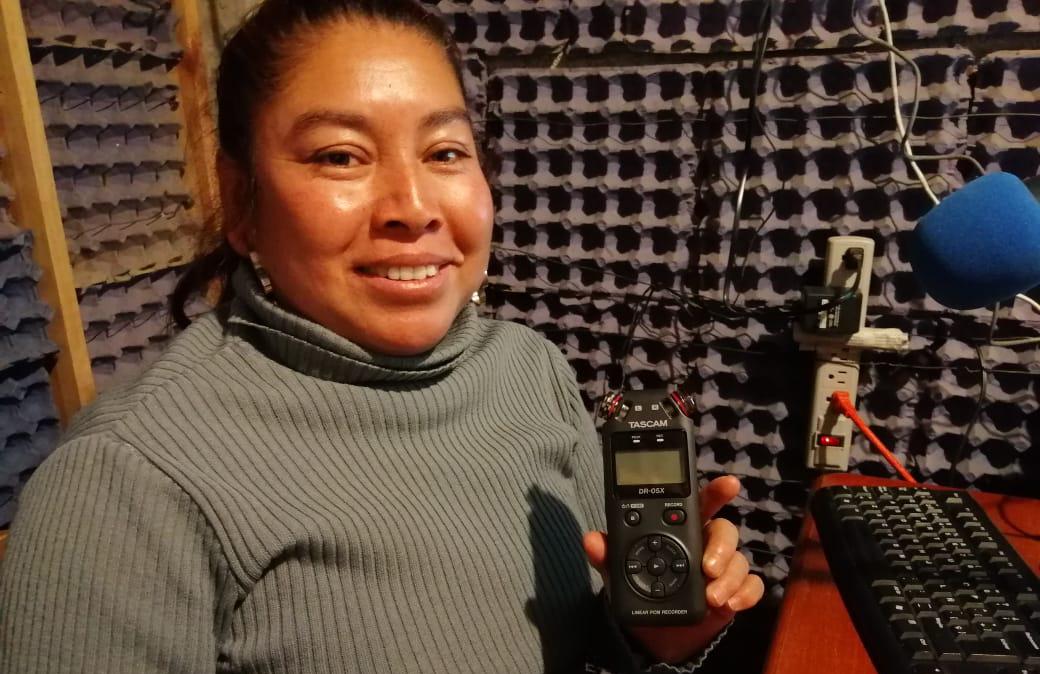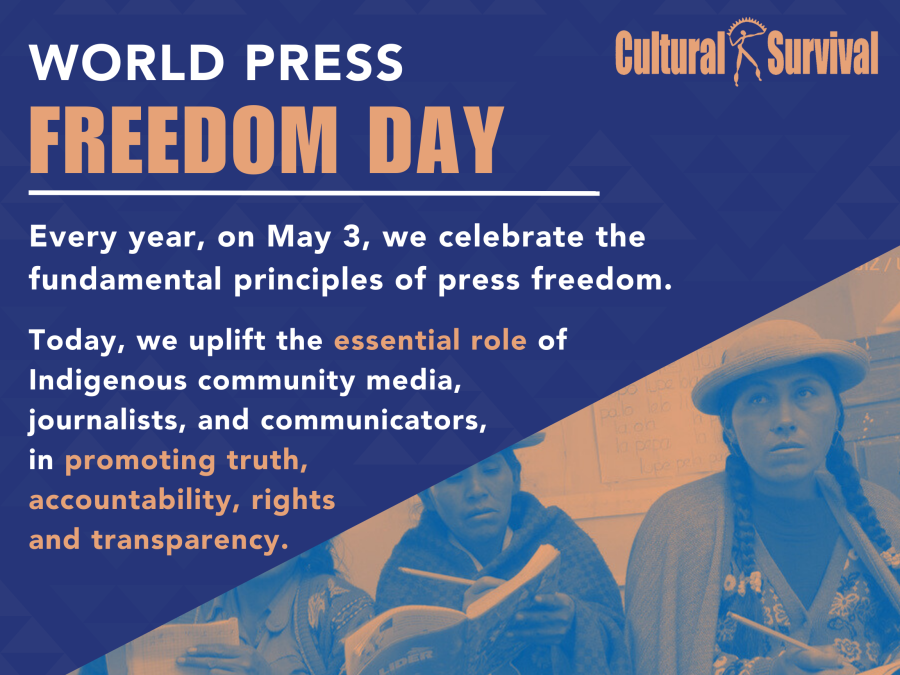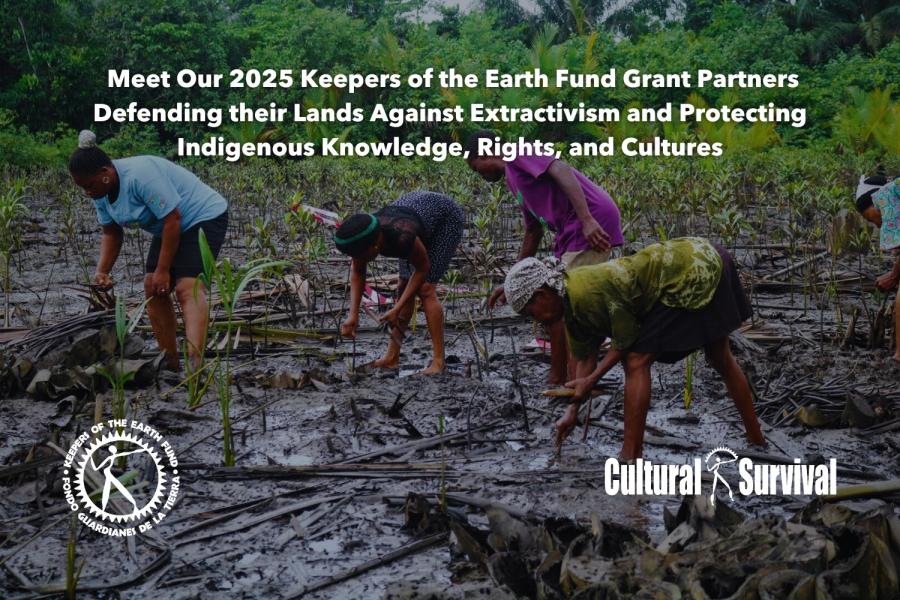
By Teresita Orozco (CS STAFF)
COVID-19 affected 2020 and forced educational systems at all levels to change to and adapt to the online models. Similarly, in-person meetings, trainings, public presentations, and events have had to be reinvented, virtually. At Cultural Survival, all of our programs were impacted in some way, including pausing our regular in-person community visits and our trainings for Indigenous women in radio journalism and broadcasting required us to abide by the new social distancing norm. Since 2016, Cultural Survival has organized capacity building workshops for Indigenous women in their communities in the Central American region (Guatemala, Honduras, Nicaragua, El Salvador, Costa Rica, Panama) and Mexico. We have provided training in radio production, journalism, and leadership skill-building to over 186 Indigenous women over the past five years. 2020 did not stop us from continuing to train and address the desire women have to continue to learn effective communication, journalism and radio skills on issues that affect and interest them. We adjusted to an online platform so we could continue to meet the needs of our on-the-ground partners.
"For a Visible Life in a Limited World"
In this process of skill building in the field of Indigenous community-controlled communication, Cultural Survival’s "For a Visible Life in a Limited World" training, is a holistic training with a gender equity lens aimed at Indigenous women communicators from Central America and Mexico. In our workshops, women have the space to reflect on their lives, diverse cultures, and their contributions to their communities and cultures, on the significant value of their voices, and using the tools they have at hand, such as community radio.
At Cultural Survival, we firmly believe that we cannot build capacities of Indigenous women without strengthening their knowledge of their rights, such as the right to freedom of expression, right to education, right to speak in their language, and others. This conviction about their rights gives them power, and with it they can achieve everything they set out to do. Our objective is to contribute to strengthening the leadership of Indigenous communicators, and their roles in Indigenous radio, and ensure they are well supported. They in turn will be companions and teachers for other Indigenous women who see them as role models.
These in-person spaces have been conducive for women not only to exchange experiences, but to encourage them in their roles as leaders in Indigenous community communication. Through our evaluation of these trainings, past participants have shared with us that these spaces have provided quality time for themselves, a moment to rest from their daily responsibilities, work through their fears, and find power in what they have learned in an experiential way.
“I had never left my country, not even my community. I don't even go out to do the shopping, since my husband takes care of that as he is the one who goes to town. Although everything has been new and I had some fears, I feel happy and I think that I will no longer be so afraid to go out, I have learned many things that in my 55 years I did not imagine I could do. Radio and this process are making me stronger,” expressed María Francisca Pérez del Pedernal, from La Paz, Honduras, at the end of the Central American Meeting of Women in 2017 in Guatemala City.
The COVID-19 pandemic forced us to reinvent our methodology. We were prepared to conduct our in-person meetings in Guatemala and Mexico in Spring and Summer 2020, but had to shift as a result of the pandemic. We had 40 Indigenous communicators between 14 and 55 years old lined up to participate in trainings. "When all the chaos started in March 2020, our training manager was in Honduras developing one of the in-person meetings. The outbreak of the coronavirus forced us to cancel future events and start looking for the appropriate way of transferring these learnings virtuality without losing the essence of the process," says Mark Camp, Deputy Executive Director of Cultural Survival, who also points out that this task has not been easy, as women have had to deal with many obstacles.
Indigenous women have had to overcome many barriers to have built the strength and courage to obtain and complete these trainings. Some barriers and challenges have included: access to the internet continues to be a privilege, the impacts of machismo in Indigenous women’s realization of their rights, the responsibilities of motherhood, and the inequality of women’s participation in media creation and distribution.
1. Access to the Internet is a Privilege
Climbing to the top of a mountain, maneuvering with her mobile device in search of an internet signal, and sometimes having to stand without moving to avoid losing the signal is the situation that Erika Oxom, Maya Q’eqchi’ faces with perseverance and courage every Wednesday to participate in the virtual trainings organized by Cultural Survival. Oxom is a dedicated young community communicator and volunteer at Radio Nimlajacoc, in Nimlajacoc, Cobán, Alta Verapaz, Guatemala.
During the COVID-19 pandemic, Cultural Survival trained 29 women from Mexico and Central America. Hosting and facilitating these sessions have not not been easy, and we have had to adapt to the schedules of the participants, and understand not only their availability but also their learning rhythms and create a learning space that supports all participants’ learnings. The facilitation team was very patient when providing Indigenous women with the opportunity to continue their training despite the pandemic and in the face of technological barriers, accessing equipment, and securing stable internet access and reliable electricity.
This experience has been challenging, and of the 40 women who signed up, 11 were unable to complete the online learning due to the limitations previously mentioned. In response to some of the needs related to internet access and lack of equipment, Cultural Survival provided cellular devices and scholarships to cover costs. Despite all these obstacles, we consider these online sessions to be successful nonetheless.
2. Motherhood and Machismo
In our training groups, we asked women if they had children. Some worried or feared that they would be denied the scholarship, hid that information until we let them know that we wanted to design the courses around their experiences, availability and needs. During the classes, staying focused has been a major challenge, since there were many distractions including children, husbands, and parents who demand their attention and care as sole providers.
One of the participants shares, “I become an octopus in my daily life, especially when I know that I want to do things quickly so that I have time to come to class. Sometimes I ask my husband for help and he tells me that he may not be busy, but he is always busy when it comes to taking care of children or doing chores, so I have to bring my baby to class. Sometimes that is why I do not turn on the microphone because he gets restless asking for my attention and starts to yell.” For participants like her that have small children, we carried out personalized instruction so that we adjust to their schedule and adapt to their needs.
3. Violence and Inequality
Violence and inequality continues to work against women, especially in Indigenous communities. Most Indigenous women do not have a computer to study, much less a cell phone. One participant shared “I negotiate domestic favors with my brother so that I can borrow his cell phone so that I can study.” This is just one of the many stories that are shared with us by participants. Many Indigenous women come to these online spaces with their wounded hearts believing that they are not deserving to be there. Many started discouraged and believed that their only function at their local radio station is merely ornamental, a beautiful voice to attract the audience with good music and good greetings. As the learning process unfolds, the participants realized that the world of radio is more than that. It is a source of creativity, it is a place to share their struggle for their rights and the triumphs of their Peoples. They realize that they are examples to other Indigenous women, and that their voices are the voices of the voiceless.
Progress towards true gender equality and the implementation of women’s rights without restrictions will only be possible if the visibility and effective participation of Indigenous women in communication is ensured. At Cultural Survival, we are proud to have conducted the trainings for women in 2020, and we will continue to in 2021, while adapting to local realities of what a global pandemic (and its aftermath) presents.


